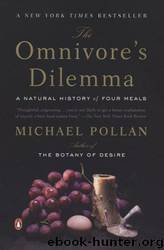The omnivore's dilemma: a natural history of four meals by Michael Pollan

Author:Michael Pollan
Language: eng
Format: mobi, epub, azw3
Tags: Sociology, Social Science, Cooking, Manners And Customs, Customs & Traditions, Nutrition, Health & Fitness, Anthropology, Food preferences, Food habits, Life Sciences - Ecology, Evolution, SCIENCE, Medical, Popular Culture - General, Anthropology - General, Archaeology, History, Technology & Engineering, Life Sciences, Ecology, Popular Culture, Food Science, General, Agriculture
ISBN: 9780143038580
Publisher: Penguin Books
Published: 2007-08-28T07:00:00+00:00
That day, my second on the farm, as Joel introduced me to each of his intricately layered enterprises, I began to understand just how radically different this sort of farming is from the industrial models I'd observed before, whether in an Iowa cornfield or an organic chicken farm in California. Indeed, it is so different that I found Polyface's system difficult to describe to myself in an orderly way. Industrial processes follow a clear, linear, hierarchical logic that is fairly easy to put into words, probably because words follow a similar logic: First this, then that; put this in here, and then out comes that. But the relationship between cows and chickens on this farm (leaving aside for the moment the other creatures and relationships present here) takes the form of a loop rather than a line, and that makes it hard to know where to start, or how to distinguish between causes and effects, subjects and objects. Is what I'm looking at in this pasture a system for producing exceptionally tasty eggs? If so, then the cattle and their manure are a means to an end. Or is it a system for producing grass-fed beef without the use of any chemicals, in which case the chickens, by fertilizing and sanitizing the cow pastures, comprise the means to that end? So does that make their eggs a product or a by-product? And is manure—theirs or the cattle's—a waste product or a raw material? (And what should we call the fly larvae?) Depending on the point of view you take—that of the chicken, the cow, or even the grass—the relationship between subject and object, cause and effect, flips. Joel would say this is precisely the point, and precisely the distinction between a biological and an industrial system. "In an ecological system like this everything's connected to everything else, so you can't change one thing without changing ten other things.
"Take the issue of scale. I could sell a whole lot more chickens and eggs than I do. They're my most profitable items, and the market is telling me to produce more of them. Operating under the industrial paradigm, I could boost production however much I wanted—just buy more chicks and more feed, crank up that machine. But in a biological system you can never do just one thing, and I couldn't add many more chickens without messing up something else.
"Here's an example: This pasture can absorb four hundred units of nitrogen a year. That translates into four visits from the Eggmobile or two passes of a broiler pen. If I ran any more Eggmobiles or broiler pens over it, the chickens would put down more nitrogen than the grass could metabolize. Whatever the grass couldn't absorb would run off, and suddenly I have a pollution problem." Quality would suffer, too: Unless he added more cattle, to produce more grubs for the chickens and to keep the grass short enough for them to eat it, those chickens and eggs would not taste nearly as good as they do.
Download
The omnivore's dilemma: a natural history of four meals by Michael Pollan.epub
The omnivore's dilemma: a natural history of four meals by Michael Pollan.azw3
This site does not store any files on its server. We only index and link to content provided by other sites. Please contact the content providers to delete copyright contents if any and email us, we'll remove relevant links or contents immediately.
Craft Beer for the Homebrewer by Michael Agnew(17461)
Marijuana Grower's Handbook by Ed Rosenthal(3122)
Barkskins by Annie Proulx(2884)
Project Animal Farm: An Accidental Journey into the Secret World of Farming and the Truth About Our Food by Sonia Faruqi(2667)
Red Famine: Stalin's War on Ukraine by Anne Applebaum(2467)
The Plant Messiah by Carlos Magdalena(2458)
Organic Mushroom Farming and Mycoremediation by Tradd Cotter(2313)
0041152001443424520 .pdf by Unknown(2228)
In the Woods by Tana French(2005)
Beer is proof God loves us by Charles W. Bamforth(1935)
The Art of Making Gelato by Morgan Morano(1901)
Meathooked by Marta Zaraska(1893)
Birds, Beasts and Relatives by Gerald Durrell(1869)
Reservoir 13 by Jon McGregor(1856)
The 7 Habits of Highly Effective People: Powerful Lessons in Personal Change (25th Anniversary Edition) by Covey Stephen R(1839)
Borders by unknow(1790)
The Lean Farm Guide to Growing Vegetables: More In-Depth Lean Techniques for Efficient Organic Production by Ben Hartman(1789)
The 7 Habits of Highly Effective People: Powerful Lessons in Personal Change by Stephen R. Covey(1767)
Urban Farming by Thomas Fox(1751)
